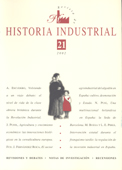Intervención estatal durante elfranquismo tardío: la regulación de la inversión industrial en España (1963-1980)
DOI:
https://doi.org/10.1344/rhi.v0i21.19403Paraules clau:
Industrial Regulation, Regulator’s Capture, Spanish Economy, Firm’s SizeResum
En este artículo se estudia la regulación industrial a partir de los primeros años sesenta hasta las postrimerías del régimen franquista, aportándose evidencias que avalan la tesis de que el impulso liberalizador que supuso el Plan de Estabilización se agotó en pocos años y dio paso a un creciente intervencionismo.Para comprobar este planteamiento se expone con detalle la evolución de las normas que regularon la instalación y modificación de industrias en este período. Asimismo, se investigan sus objetivos teóricos referentes al incremento del tamaño de la planta fabril, comprobándose su incumplimiento. Y finalmente se analizan las posibles causas de este fracaso, planteando de manera especial la hipótesis de una posible captura de los reguladores por los empresarios establecidos para dificultar la entrada de nuevos competidores. Los resultados obtenidos abonan esta hipótesis en el caso de las industrias oligopolistas, pero también muestran que, en otros casos, los resultados de la regulación fueron diferentes. Así, en algunos sectores, como el de las ramas textiles, el alto nivel de regulación estuvo justificado por razones de reestructuración. En otros, la regulación sirvió para extender el poder e influencia del propio Estado encarnado, en este caso, en el grupo empresarial público. En definitiva, la interacción entre el Estado regulador y los empresarios regulados dio lugar a que los intereses de ambos grupos estuvieran en conflicto permanente alrededor de la aplicación práctica de esta regulación industrial, lo que originó diferentes resultados en cada sector industrial.
Descàrregues
Les dades de descàrrega encara no estan disponibles.
Descàrregues
Publicades
2017-07-13
Com citar
Buesa, Mikel, and Luis Eduardo Pires Jiménez. 2017. “Intervención Estatal Durante Elfranquismo tardío: La regulación De La inversión Industrial En España (1963-1980)”. Revista De Historia Industrial, no. 21 (July):159-98. https://doi.org/10.1344/rhi.v0i21.19403.
Número
Secció
Articles
Llicència
El/la autor/a cede los derechos al/la editor/a. Creative Commons
El/la autor/a que publica en esta revista está de acuerdo con los términos siguientes:- El/la autor/a cede en exclusiva todos los derechos de propiedad intelectual al/la editor/a para todo el mundo y toda la duración de los derechos de propiedad intelectual vigentes aplicables.
- El/la editor/a difundirá los textos con la licencia de reconocimiento de Creative Commons que permite compartir la obra con terceros, siempre que éstos reconozcan su autoría, su publicación inicial en esta revista y las condiciones de la licencia.





